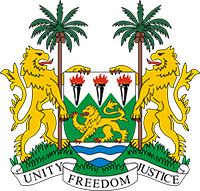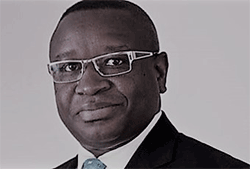ABOUT SIERRA LEONE

Sierra Leone Coat of Arms
|

President Dr. Julius Maada Bio
|

Sierra Leone National Flag
|
Sierra Leone is situated on the West Africa bordering Liberia and Guinea. The name Sierra Leone dates back to 1462, when a Portuguese explorer, Pedro de Sintra sailed down the coast of West Africa and named the country “Serra Leoa” due to the shape and/or climatic conditions that he experienced. “Serra Leoa” meaning Lion Mountains. This later became known as Sierra Leone.
Sierra Leone is currently divided into five administrative regions namely; Southern region, Eastern region, North-East region, North-West region and Western Area (Urban and Rural).
There are 16 ethnic groups namely Mende, Temne, Limba, Kono, Kuranko, Yalunka, Loko, Susu, Madingo, Fula, Bullom/Sherbro, Kru, Vai, Gola, Kissi and Krio.
The Government of Sierra Leone
The Sierra Leone Government is divided into three arms namely; the Legislative, the Executive, and the Judiciary. These organs are independent of each other but relates through checks and balances as enshrine in the constitution.
The Legislative
The House of Parliament is the Legislative Arm of the Government tasked by the Constitution of Sierra Leone Act No.6 of 1991 to formulate and enact laws or legislations. The current Parliament consists of a total of 149 seats, including 135 directly elected members from district blocks and 14 Paramount Chiefs indirectly elected from the 14 Districts of Sierra Leone. Parliamentarians are elected on a five-year term as members of a political party or independent candidates. The current parliament, which is the sixth Parliament of the second Republic of Sierra Leone, comprises only the two major political parties. The ruling Sierra Leone Peoples Party (SLPP) holds 81 seats, whilst the main opposition party, the All Peoples Congress (APC), holds 54 seats. The parliament of Sierra Leone is headed by the Speaker who presides over parliamentary proceedings and the Deputy Speaker assumes this role in the absence of the Speaker. Parliament is usually dissolved at least 30 days and at most 90 days before the general elections and the commencement of each parliamentary session is marked by the State of the Nation Address from the President who outlines the Government’s achievements and plans to the Members of Parliament.
The current parliament comprises 32 Committees the latest one being the Committee on Statutory Instruments set up in October 2013. These include 7 House related Committees such as the Committee for vetting of Appointments made by the Office of the President, the Legislative Committee which analyzes draft Bills, etc.; 3 are finance related committees namely, the Public Accounts Committee (PAC), Finance Committee and the Transparency and Accountability Committee and the remaining 22 are subject-related oversight committees covering the different MDAs/areas in the executive.
The Executive
The Executive arm is led by the President as Head of State and Commander-in-Chief of the Armed Forces of Sierra Leone. The President is elected by popular vote for a five-year term and the tenure of office is limited to two five-year terms. As Head of State, the President wields executive authority to appoint his Cabinet Ministers, and heads of parastatals. The executive formulates Government policies.
The current Cabinet consist of a Chief Minister and 28 sector Ministers assisted by 31 deputy Ministers. There are six Ministers of State, five serving as Resident Ministers for the Eastern, Southern, Northern, North-Western and Western regions; and one in the Office of the Vice President.
The Judiciary
The Judiciary arm of Government is headed by the Chief Justice of Sierra Leone. It comprises of the Supreme Court, Court of Appeal, High Court, Magistrate Court and Local Courts.
The Judiciary arm of Government is mandated to interpret and apply the laws of Sierra Leone and to administer justice to all within the boundaries of Sierra Leone. The Judiciary also provides alternative mechanisms for dispute resolution. Its independence from other arms of Government is protected by the constitution.
The Supreme Court serves as the final court for litigation and it has jurisdiction in constitutional, criminal, and civil matters. The Court of Appeal only has an appellate jurisdiction to look into decisions of the High Court. The High Court is a court of first instance (you can initiate or commence proceedings in it) and it also has an appellate jurisdiction on decisions from the Magistrate Court. The Magistrate Courts are established in all districts across the country. The Local Courts are the lowest courts in the country and are based on local customs and traditions, with legal proceedings held by local elected leaders.
All Judges including the Chief Justice, are appointed by the President and subject to Parliamentary approval.
|
